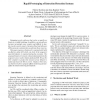725 search results - page 106 / 145 » Learning Behaviors Models for Robot Execution Control |
CUZA
2002
13 years 8 months ago
2002
This paper presents Process Algebra for Predictible Control Systems (PAPCS) as a model for specifying and analysis of concurrent, time and resource dependent, distributed control s...
CEC
2009
IEEE
14 years 2 days ago
2009
IEEE
In evolutionary robotics, controllers are often designed in simulation, then transferred onto the real system. Nevertheless, when no accurate model is available, controller transfe...
AR
2008
13 years 8 months ago
2008
Human-like behavior is crucial for intelligent service robots that are to perform versatile tasks in day to day life. In this paper, an integrated approach to human-like manipulat...
RSP
2007
IEEE
14 years 3 months ago
2007
IEEE
Designing security softwares that evolve as quickly as threats is a truthful challenge. In addition, current software becomes increasingly more complex and difficult to handle ev...
CORR
2011
Springer
13 years 3 months ago
2011
Springer
Modeling the behavior of imperfect agents from a small number of observations is a difficult, but important task. In the singleagent decision-theoretic setting, inverse optimal co...

